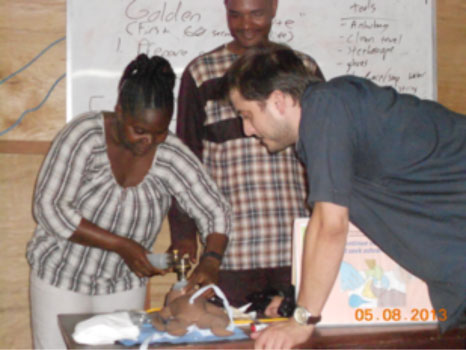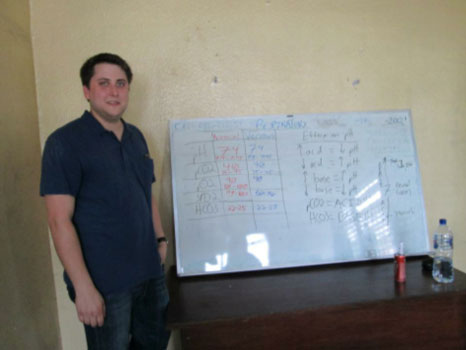Canadian Respiratory Therapists Have Much To Celebrate in 2014!
December 30, 2013A Continuum of Respiratory Care in Haiti
March 20, 2014Mike Davis, BSc, RRT
 Respiratory care is of great importance in Liberia, where the leading cause of death for all ages is respiratory failure (most commonly in response to acute respiratory infection); moreover, this cause of death keeps Liberia with one of the highest rates of infant mortality in the world. Through a joint project involving the Liberian Healthcare Initiative and Trusted Angels Foundation, I facilitated the establishment of respiratory care licensure and the first respiratory care school in Liberia. It is my hope that the implementation of a trained and caring respiratory care workforce will increase the span and quality of life while decreasing infant mortality in the Sweet Land of Liberty.
Respiratory care is of great importance in Liberia, where the leading cause of death for all ages is respiratory failure (most commonly in response to acute respiratory infection); moreover, this cause of death keeps Liberia with one of the highest rates of infant mortality in the world. Through a joint project involving the Liberian Healthcare Initiative and Trusted Angels Foundation, I facilitated the establishment of respiratory care licensure and the first respiratory care school in Liberia. It is my hope that the implementation of a trained and caring respiratory care workforce will increase the span and quality of life while decreasing infant mortality in the Sweet Land of Liberty.
Overview: In the Fall of 2011, Joseph Moore and I met in Monrovia, Liberia. Joseph is a Liberian who had worked as an RRT in the United States. After Liberia’s recent and devastating civil wars, Joseph returned to his country to try and help their medical infrastructure. It only took one day of volunteering at the national hospital to demonstrate the important contributions a respiratory therapist can to the interdisciplinary clinical team; by the end of his first week, Joseph was given a small team of healthcare workers to train and work within the first department of Respiratory Care at JFK hospital in Liberia. Although this was a monumental achievement, Joseph quickly realized the lack of sustainability and outreach of his department. In order to have a significant impact in Liberia, a school would be needed to train RTs who could service broader regions of the country than JFK hospital. After consulting with the Ministry of Health and Social Welfare (MoHSW), and the Liberian Board of Medicine and Dentistry (LBMD), we decided to open the Liberian Respiratory Healthcare Institute (LRHI).

Mike Davis, BSc, RRT is an exhaled breath condensate researcher and Ph.D physiology student at Virginia Commonwealth University in Richmond, Virginia.
In order to create a profession of Respiratory Care that exceeded the boundaries of Joseph’s on-the-job trained (OJT) department, we needed to establish a licensure that would be recognized nationwide. We worked with the LBMD to create that licensure at the end of 2011 and opened the doors of the LRHI in January 2012. Two year later, as the LHRI nears graduation of its charter class (Summer 2014), many transitions have occurred. The school’s original campus was a room without electricity in an abandoned building in downtown Liberia; from there, we moved to a tin shack on the roof of that building. Laboratory exercises took place in the RT stockroom at JFK hospital. January of 2014, we acquired a campus alongside the Smythe Institute for Health Sciences near JFK hospital. This campus shares electricity, a library, and a simulation laboratory with the Smythe nursing school. More importantly, moving onto this campus provided the much-needed accreditation from the Liberian Board of Higher Education that will allow for the students to receive nationally-recognized Associate Degrees from the LHRI. This June I will be returning to Liberia to witness the graduation of the first class of Respiratory Care Practitioners in West Africa. After securing the partnership with Smythe Institute and the demonstration of successful graduation by the charter students, I believe that the LHRI has attained a sustainability that will foster respiratory care in this wonderful nation.


